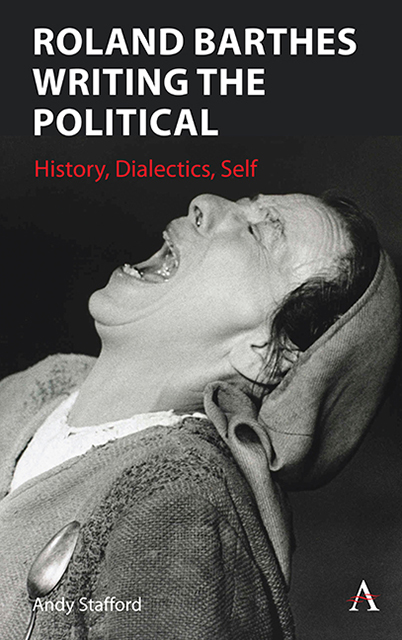Book contents
- Frontmatter
- Contents
- Acknowledgements
- Foreword
- Chapter One ‘The Dialectical Logic of Love’
- Chapter Two ‘Amorous Dialectic’
- Chapter Three ‘The People Chorus’
- Chapter Four ‘Double Grasp’
- Chapter Five ‘Stereographic Space’
- Chapter Six ‘Non-Classifiable’
- Chapter Seven ‘New Dialectic’
- Chapter Eight ‘Opacity’
- Chapter Nine ‘Undialectics’
- Afterword: Essayism and the Politics of Writing
- Bibliography
- Index
Chapter Five - ‘Stereographic Space’
Published online by Cambridge University Press: 08 June 2023
- Frontmatter
- Contents
- Acknowledgements
- Foreword
- Chapter One ‘The Dialectical Logic of Love’
- Chapter Two ‘Amorous Dialectic’
- Chapter Three ‘The People Chorus’
- Chapter Four ‘Double Grasp’
- Chapter Five ‘Stereographic Space’
- Chapter Six ‘Non-Classifiable’
- Chapter Seven ‘New Dialectic’
- Chapter Eight ‘Opacity’
- Chapter Nine ‘Undialectics’
- Afterword: Essayism and the Politics of Writing
- Bibliography
- Index
Summary
[I]n a world condemned to signs […], what we call mass culture can only be judged very ambiguously, very dialectically […]. [I]t is a culture that conceals the sign, that works on values that are always presented as natural and conceal the arbitrary character of the sign systems.
(Barthes 2015a, 119)So far we have considered the dialectical interventionist, and especially earlier, Barthes, by looking at the twin inheritance from Michelet and Marx, whilst asserting the competing epistemologies of early Nietzsche. Across theatre (both ancient Greek and modern Brechtian epic), contemporary myth and the historiality of criticism, Barthes's use of a ‘double grasp’ has signalled the political nature of his writing as it confronts a responsibility of forms within a determined defence of left-wing critique. Now the analysis moves onto a more creative and mobile form of critical praxis.
Macé (2006, 232) locates both Empire of Signs and S/Z on the cusp ‘between a met-alinguistic and a fictional moment’. The ‘double grasp’, as we shall see, involves the pleasure of reading, but also then writing. However, the pleasure of the ‘double grasp’ is also in its very deconstruction. In what Barthes calls a ‘new dialectic’, the very notion and practice of the ‘double grasp’ will be shown to undergo a ‘mutation’; and it is in his 1970 essay Empire of Signs that we will trace its trajectory in Chapter Seven, before showing the limits of this ‘new dialectic’ in the diaries Barthes kept during his 1974 visit to China. Before this, we need to consider two major elements in the ‘mutation’ that takes place in Barthesian thought and critical praxis across the 1960s. In Chapter Six we will consider the critique of systems and classifications, but first we need, for the philosophy of politics we are aiming to define, to track what it means to start ‘losing ground’ (Brown 1992, 13–63). However, the metaphor of ‘drifter’ that Brown attributes to Barthes will be replaced by a much more active, even voluntarist, metaphor, that of perte.
Turning the Tables: Creative Criticism and the Loss of Self: From Historiality to Apersonalism
Weakly (and pessimistically) translated as ‘loss’ in English, Barthesian perte – as distinct from the version in Georges Bataille's thought – is the politicized corroding of the notion of self, a relentless but not aggressive critique of personal identity, of national, linguistic and cultural tropisms that underpin selfhood.
- Type
- Chapter
- Information
- Roland Barthes Writing the PoliticalHistory, Dialectics, Self, pp. 99 - 124Publisher: Anthem PressPrint publication year: 2022



